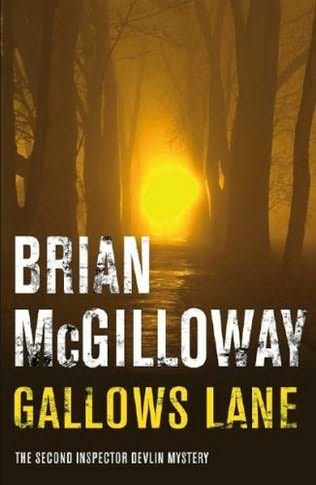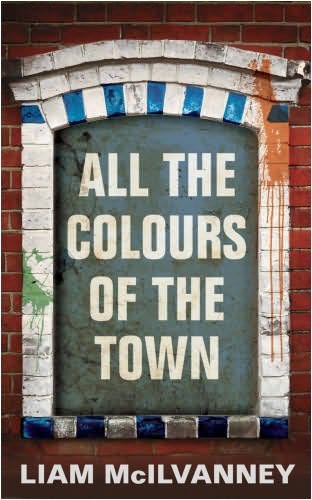I'm delighted to bring you something special for the weekend, dear readers.
Colin Bateman is set to read at the
Wigtown Book Festival in Scotland tomorrow with
Ian Sansom. Ahead of his appearance, he has allowed me to publish the short story that he's written especially for the festival. Sweet, right? So, without further ado, give this never-seen-before Bateman short story a read, and please leave a comment. I mean, seriously, how often are you going to get an opportunity to tell a writer of Bateman's calibre exactly what you think of his work?
 Unhappy Endings
Unhappy Endings I say yes to a lot of things I shouldn’t really say yes to, like the writing of this short story. It’s worth about a grand, but out of that there’s an agent to pay and a few pounds whittled away on research. It’ll appear under a pseudonym, nobody will ever connect me to it; it’s quite liberating, actually, I don’t have to worry about what critics think or my literary reputation and I can just indulge in flights of fancy or get away with murder or generally just please myself. The problem is that there’s always an unhappy ending, and that depresses me. Not at the time, you understand, but later. I just have a thing about writing unhappy endings.
My research isn’t much more than sitting in the pub having a few pints watching and listening, because I’m not really one for learning the intricate details of anything. If there’s brain surgery in my story, I don’t feel the need to talk to a brain surgeon. I look it up on the net, give it a cursory read and then wing it. If you crash landed on a desert island and the pilot had a fractured skull and you had to operate to save his life so that he could, after a substantial period of recovery and perhaps physiotherapy and rehabilitation, together with the frequent consumption of the milk of coconuts, somehow repair the plane and fly you out of there, you wouldn’t want to use my story as a guide to how to drill into his head to relieve the pressure or take out the blood clot, because you’d really mess him up. He’d be slobbering in a wheelchair for the rest of his life, pointing the finger of blame at me, though of course he wouldn’t be able to literally point the finger of blame at me because well, you would have drilled into the area of the brain that controls the finger of blame. On my advice you would also have used the corkscrew you rescued from the premier seats at the front to do the drilling, pausing only to comment sardonically that planes don’t reverse into crashes and they should have the rich seats at the back. Actually using the corkscrew would be pretty damn sore unless you improvised chloroform using a mixture of vodka, egg whites and broccoli. You can’t really improvise chloroform using vodka, egg whites and broccoli. Don’t try it at home, because it’s really difficult to get the right kind of broccoli. You need Spanish broccoli, grown in the foot hills of the Andes. You see, when information is presented in fiction you have a tendency to accept it as fact just because it’s there on the page before you; you presume we’ve done the research. Think about it. The Andes aren’t in Spain, but you just blithely accepted that they were.
This story features a woman who works in a bank. She could work anywhere because it’s not really relevant, but having her work in a bank adds a certain
je ne sais quoi given what later develops with the banknotes. I can toss in
je ne sais quoi because it’s French everyone understands. I don’t speak French. If I made her a French banker I’d really be screwed because even though the story would be in English, you’d expect her to come out with a couple of French words just to make her character seem kosher. A French Jew, in fact. She’s from Montmartrelle, I might say, which shows that I can look up a map of Paris, and then corrupt not only the specific area but the entire
arrondissement just enough to make it appear like it’s really based on Montmartre and I’ve changed it subtly because what I’m writing is too damn close to the truth to allow me to use its real name. What I’m writing must be closer to
roman a clef than fiction, which also adds a certain
frisson which will be further advanced by the pointless and distracting use of italics. All of which will be entirely irrelevant, because she’s not a French Jewess from Montmartrelle, but a banker from Derby.
The hotel bar is modern with a pale wooden floor. You would think it would stain, but it can be wiped clean with a damp sponge. The ambience is provided by Sky Sports News with the sound high enough to be distracting but low enough not to impart any information, and the screen is just far enough away from where I’m sitting to prevent me from accurately reading the tickertape information at the bottom or the league tables and fixtures at the side. Sky Sports News is thus failing to inform me of anything on several different levels. The situation could be rectified if I simply moved closer, but I’ve become captivated by the Derby woman having a heart to heart with her boyfriend. I never actually see her boyfriend’s face because they’re both hidden by a pillar, and I don’t hear anything he says because he’s quietly spoken, but I hear everything she says because she’s louder, and I’m drawn to her because I was once engaged to a woman who said she came from Derby. I killed that woman because she tried to break it off. When the Jehovah’s Witnesses came to the door shortly afterwards, I still had blood and soil on my hands. They asked to speak to the woman from Derby, with whom they clearly had already established some kind of relationship, or she must have at least hinted at some stage that she might be willing to let them in, which is a dangerous thing to do with Jehovah’s Witnesses, or Mormons, or insurance salesmen, because they’re like multiple dogs with multiple bones, but I told them that I had just murdered her and buried her under the patio. People will accept anything if you present it in the right way. They laughed politely and left, no doubt discussing my unusual sense of humour, and I was able to make a clean getaway, that time, even though I would have been quite intrigued to discover if Jehovah’s Witnesses actually made for good witnesses.
It takes a lot of work to dig up a patio.
It’s useful to have a power point near by.
I catch a glimpse of the guy leaving. When I peer around the pillar and ask her if she’s okay, because she’s sobbing, she says there was no need for him to storm off like that. For the purposes of this story, she is good looking. If she was some big thunder-thighed porpoise, what follows would feel rather sordid, and you would probably allow it to colour your perceptions of me as a person. It is a universal truth that people prefer to read about attractive people making love, because you can understand the animal passions they might arouse in each other. If she had thick ankles and sagging arms and skin like a peppered mackerel, then it would just read as if I was taking advantage of her despair. So for the purposes of this story she is attractive. We are both, in fact, attractive. In fact, I’m gorgeous. Also, it would probably work better if it was set in Montmartrelle, with the bells of the Eiffel Tower peeling softly in the background, but for the purposes of this story the location will remain firmly here, in this dull city. But don’t worry, she is not another one who ends up under the patio. That would be ridiculous. Her room is on the nineteenth floor of this hotel, up where there are no patios.
In retrospect, I will remove the bells from the Eiffel Tower. I could only justify them by creating an alternative history for France in general and the Tower in particular, one in which Napoleon wasn’t defeated at Waterloo etc. etc. and I would have to continue you right up to the modern era and actually make her a French banker, but this is a short story and they’re paying by the word, and it’s really not worth the effort.
I get into her room by telling her the story about the man who won the lottery. It always works. He was an ugly man who very occasionally had ugly girlfriends, which is another universal truth. But when he won the lottery he decided that now he was entitled to enjoy the company of the most beautiful woman in the world. He found her in a hotel just like this one, I say. He watched her all night, and she too had had a row with her boyfriend, and he too had stormed off leaving her without any money of her own, which was ironic, because she worked in a bank.
It wasn’t really ironic, but I was playing my game.
‘I work in a bank too!’ my lady cries.
‘Really? What a coincidence. Anyway, the woman in my ugly lottery man story wanted to stay out and have a good time, but now she was going to have to go back to her room all by her lonely self and cry. Except, this ugly lottery guy sidles up to her and says, you don’t normally talk to guys like me, and you’ll probably slap me in the face, but today I became richer than I ever thought I could be, and I want to do something really special, I want to make love to you. He told her she was the most beautiful woman he had ever seen and that he knew that under normal circumstances she would never look even once at him, but he had seen her being abandoned by her man, and observed her checking her purse for money she did not have, and now he wanted to make her an offer. He told her he had thirty thousand pounds in cash in his jacket and that he would give her all of it in exchange for one hour in bed with her.
Her first instinct, naturally, was to call security, but she hesitated, and she started to think about how awful her boyfriend was to leave her like that, even though she still loved him, and how much thirty thousand was, and how nobody would ever have to know what she’d done for it; she could say that she had won the lottery, and in some ways she had.
And I pause there and take a sip of my drink.
‘Well, did she do it, did she?’
The Derby woman is well and truly sucked in.
I nod.
‘Oh, the little……and did she….did she enjoy it? You know what they say about ugly men. Did she fall in love and….?’
‘She hated it. He did all sorts of despicable things to her, but she didn’t think she could protest. She kept thinking of the money.’
‘And I’ll bet he ran off without paying her!’
‘No. He paid her. Thirty thousand. And an extra five for her tears. But before he handed it over, and when he was still lying on top of her, he said, just one more thing. Kiss me and this time use your tongue.’
She hadn’t used it at all. She was keeping it for her boyfriend. Using her tongue somehow seemed more intimate than any of the unspeakable acts she had so recently partaken of.
I ask the Derby woman if she understands why the woman in my story was so reluctant to use her tongue.
The woman from Derby nods. ‘But did she, in the end? Did she give in and use her tongue?’
‘She did. She did. And he gave her the money, and he left and she never spoke of what had happened, never told a living soul.’
‘Gosh,’ the woman from Derby says.
It is not a word you hear very often these days.
Gosh.
‘What kind of despicable things?’ is her next question.
Despicable is another word you don’t hear very often.
The chances of somebody coming up to you in a courtroom, after the verdict has been handed down, and saying, ‘Gosh, you are despicable,’ must be extremely remote indeed.
I tell her about his despicable acts in considerable detail, and she pretends to be shocked, but it brings colour to her cheeks and there’s a coy look to her as she murmurs, ‘Still, thirty five thousand pounds.’
I smile, and pat my jacket pocket, and her brow furrows, and I raise an eyebrow, and there’s a sudden sparkle in her eyes and for a long, long moment she believes that I have thirty five thousand pounds for her.
She whispers, ‘You’re not ugly at all,’ and she’s right, because as we have already established, for the purposes of this story, I am gorgeous. But then I laugh and tell her that I’m a writer and the story of the lottery winner with the cash for sex offer is from one of my short stories. She looks disappointed. I say, forget the money, I’m still capable of despicable acts. And that gets her laughing, where really, it shouldn’t. She asks me if that’s really how the story ends and I tell her no, that after the lottery winner left the woman went back down to the bar and ordered a bottle of champagne, being thirty five thousand pounds better off, but when she tried to pay for it the bar man held her twenty up to the light and said it was counterfeit, and upon further examination, they all were. She took the thirty thousand pounds out of her bag and threw them on the ground and stamped and tore at them, and just at that point her boyfriend returned, all ready to apologise, but such was her rage that she blurted out what had happened, and he stormed out again, this time for good.
My woman goes, ‘Oh!’ and ‘Oh!’ and that’s just a
horrible story.
She’s quite drunk now, and she is relatively easily persuaded to her room. She finds it exciting, at first, the tearing off of the clothes and the fumbling and tumbling, because her boyfriend might return at any moment, but when we make love she seems disappointed that I do not perform despicable deeds upon her, and she urges me to hurry up and finish, which is difficult now that I can sense her regret.
As I lay upon her, I say there was an alternative ending to that story about the lottery winner and the woman of easy but expensive virtue.
And she says, ‘What?’ as in what are you talking about the short story for while you’re supposed to be finishing off.
And I say, she didn’t really go down to the bar and find out she’d been fobbed off with dodgy banknotes. Didn’t you pick up on the fact that if she worked in a bank, she would probably have recognised straight away that the twenties were fake? .
She sighs and says: ‘Well,
what then?’
My lips move to her ear and I whisper, ‘The reason she never spoke about it again was that she couldn’t. When she put her tongue in his mouth, he bit it off. She bled to death there beneath him, and he stared at her the whole time she was dying, and she couldn’t move because of the weight of him upon her, and the fact that he was still inside her.’
I think it is unlikely that she will have an orgasm now.
‘What kind of a writer are you anyway?’ she hisses as she tries to get out from under me. ‘Who would come up with a nasty, disgusting sort of a story like that?’
And I tell her that when I was learning how to become a writer, the best piece of advice my tutor ever gave me was to write about what you know.
He was a good creative writing teacher.
He came to our prison every week.
But he always had a problem with my unhappy endings.



























